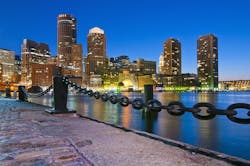Boston Mayor Announces New Policy Utilizing Green Infrastructure
Boston Mayor Michelle Wu recently announced a new policy to require that certain city projects must include environmental benefits and stormwater mitigation through green infrastructure.
According to a release on the City of Boston's website, the policy establishes "five new standard designs and the necessary accompanying maintenance resources to expand the implementation of small-scale green infrastructure installations in Boston."
The new policy says that in dense urban areas where space in public sidewalks and roadways is limited, "small-scale green infrastructure (GI) can be effective in reducing stormwater flooding, promoting groundwater recharge, and filtering pollutants from runoff."
The new policy applies to curb extensions. Historically, due to Boston's compact nature, curb extension projects create small spaces that have been paved with impervious materials. The release states that the five new design alternatives are:
- Right-of-way bioretention: Curb extensions may incorporate green infrastructure in the form of rain gardens, bioswales, etc.
- Infiltration Tree Pit/Tree Trench: Curb extensions may incorporate green infrastructure in these forms.
- Porous Paving: Curb extensions may incorporate porous asphalt, permeable pavers, porous paver installations, and porous concrete slabs.
- Subsurface Infiltration Area: Curb extensions may incorporate stone subsurface infiltration areas (with or without perforated pipe).
- One-time Seeding: The area within the curb extension may be seeded once with a groundcover, low-grow fescue or wildflower mix.
“These new design standards will allow the City to continue enhancing our streets as public spaces for everyone,” said Chief of Streets Jascha Franklin-Hodge, in the city's release. “These curb extensions help keep our neighborhood safe by slowing cars and making street crossing easier for pedestrians and now they can also benefit our quality of life by providing more green space in our City.”
In addition to these five designs, two green infrastructure-specific maintenance contracts will be available for new and existing public installations, the first of which is for maintenance on porous paving installations and the second, which is for landscape maintenance on green infrastructure features.


